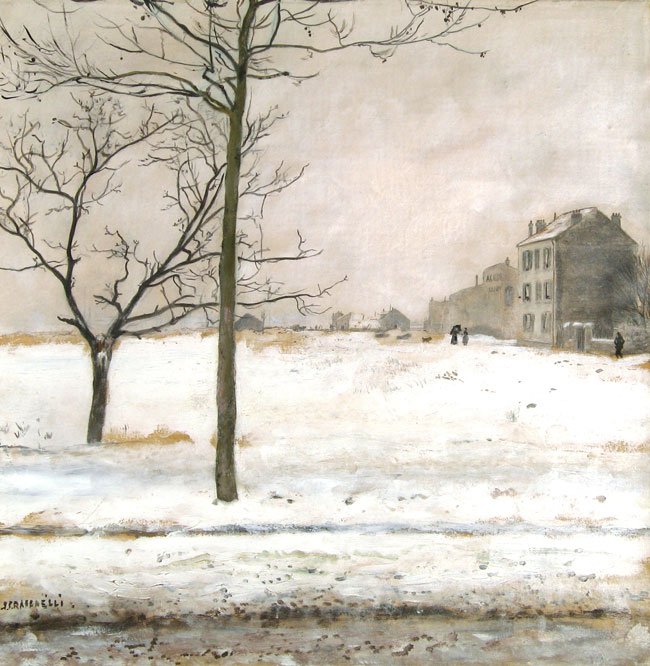JEAN-FRANÇOIS RAFFAËLLI PAINTINGS FOR SALE & BIOGRAPHY
JEAN-FRANÇOIS RAFFAËLLI
French, 1850-1924
BIOGRAPHY
“Jean-François Raffaëlli's father was a failed Italian businessman and Raffaëlli himself was, among other things, a church chorister, actor and theatre singer. He then studied under Gérôme at the École des Beaux-Arts in Paris. He travelled to Italy, Spain and Algeria and on his return to France settled in Asnières.
“In 1876, on a trip to Brittany, he first saw the potential of realist subject matter, if treated seriously. He became involved in meetings of artists at the Café Guerbois, where the Impressionist painters used to gather. As a result, Degas, contrary to the advice of the group, introduced Raffaëlli to the Impressionist exhibitions - according to one uncertain source as early as the very first exhibition, at the home of Nadar, and certainly to those of 1880 and 1881.
“In 1904, Raffaëlli founded the Society for Original Colour Engraving. He first exhibited at the Salon de Paris in 1870 and continued to exhibit there until he joined the Salon des Artistes Français in 1881, where he earned a commendation in 1885, was made Chevalier of the Légion d'Honneur in 1889 and in the same year was awarded a gold medal at the Exposition Universelle. In 1906 he was made Officier of the Légion d'Honneur. He was also a member of the Société Nationale des Beaux-Arts. In 1884, a private exhibition of his work cemented his reputation.
“He contributed to several newspapers such as The Black Cat (Le Chat Noir) in 1885 and The French Mail (Le Courrier Français) in 1886 and 1887. He published a collection entitled Parisian Characters, which captured his favourite themes of the street, the neighbourhood and local people going about their lives. In 1880 he participated, with Forain, on the illustration of Joris Karl Huysmans' Parisian Sketches (Croquis Parisiens). He also illustrated Huysman's Works. As well as working as an illustrator, he also made etchings and coloured dry-points.
“His early attempts at painting were genre scenes, but once he was settled in Asnières he started to paint picturesque views of Parisian suburbs. From 1879 onwards, his subject matter drew on the lives of local people. These popular themes, which he treated with humanity and a social conscience, brought him to the attention of the social realist writers of the time such as Émile Zola. In addition to his realist style, Raffaëlli's dark palette, which ran contrary to the Impressionist aesthethic, helped to explain the opposition of those painters to his participation in their exhibitions. More concerned with drawing than colour, he used black and white for most of his paintings. Towards the end of his life, he lightened his palette, but without adopting any other principles of the Impressionist technique.
“After painting several portraits, including Edmond de Goncourt and Georges Clémenceau, he returned to genre painting, particularly scenes of bourgeois life. Later in his career, he painted mainly Breton-inspired sailors and views of Venice. His views of the Paris slums and the fortifications, sites which have almost completely disappeared, went some way towards establishing a genre in themselves and perpetuated the memory of the area: The Slums, Rag-and-Bone Man, Vagabond, Sandpit, In St-Denis, Area of Fortifications. His realistic and witty portrayal of typical Parisian townscapes accounts for his enduring appeal.” [Benezit, Dictionary of Artists, Paris, 2006]
Museum Collections
Art Institute of Chicago, Chicago
Bibliothèque Nationale de France, Paris
Birmingham Museums Trust, Birmingham
Brooklyn Museum, Brooklyn, NY
Cleveland Museum of Art, Cleveland, OH
Fine Arts Museums of San Francisco, San Francisco
Harvard University Art Museums, Cambridge, MA
Huntington Museum of Art, Huntington, WV
Indianapolis Museum of Art, Indianapolis, IN
Kröller-Müller Museum, Otterlo
Los Angeles County Museum of Art, Los Angeles
Maison de Victor Hugo, Paris
Metropolitan Museum of Art, New York
Morgan Libary & Museum, New York
Musée Bonnat, Bayonne
Musée Carnavalet, Paris
Musée d’Art et d’Histoire, Saint-Denis
Musée d’Orsay, Paris
Musée de Grenoble, Grenoble
Musée de la Chartreuse, Douai
Musée de la Princesse, Verdun
Musée Fabre, Montpellier
Musée des Beaux-Arts, Agen
Musée des Beaux-Arts, Béziers
Musée des Beaux-Arts, Bordeaux
Musée des Beaux-Arts, Lille
Musée des Beaux-Arts, Lyon
Musée des Beaux-Arts, Nancy
Musée des Beaux-Arts, Nantes
Musée des Beaux-Arts, Nice
Musée des Beaux-Arts, Pau
Musée des Beaux-Arts, Reims
Musée des Beaux-Arts, Tourcoing
Musée du Petit Palais, Paris
Musée des Beaux-Arts, Bordeaux
Musée des Jacobins, Morlaix
Musée Marmottan-Monet, Paris
Musée National du Château de Versailles
Musée Rodin, Paris
Museo Nacional de Bellas Artes, Buenos Aires
Museum Boijmans Van Beuningen, Rotterdam
Museum of Fine Arts, Boston
Museum Voor Schöne Künsten, Gand
National Gallery of Art, Helsinki
National Gallery of Art, Washington, DC
National Gallery of Ireland, Dublin
National Museum, Stockholm
Pushkin Museum, Moscow
Rhode Island School of Design, Providence, RI
Schorr Collection, London
Singer Museum Laren
Smithsonian American Art Museum, Washington, DC
Van Gogh Museum, Amsterdam
Mark Murray Fine Paintings is a New York gallery specializing in buying and selling 19th century and early 20th century artwork.
Please contact us if you are interested in selling your Jean-François Raffaëlli paintings or other artwork from the 19th century and early 20th century.
JEAN-FRANÇOIS RAFFAËLLI
Paintings for sale
Jean-François Raffaëlli Paintings Previously Sold
JEAN-FRANÇOIS RAFFAËLLI
Le Carrefour Drouot, Paris
Oil on canvas
19¾ x 27½ inches (49.5 x 70cm.)
SOLD
JEAN-FRANÇOIS RAFFAËLLI
Les Boulevards des Italiens, Paris
Oil on board
10½ x 13¾ inches (27 x 34.9 cm)
SOLD
JEAN-FRANÇOIS RAFFAËLLI
Montmatre en Hiver
Oil on paper
16¼ x 16¼ inches (55.8 x 54.6 cm.)
SOLD
Additional Jean-François Raffaëlli Paintings Previously Sold
JEAN-FRANÇOIS RAFFAËLLI
A Mediterranean Courtyard
Oil on board
26 x 34 inches (66 x 86.3 cm.)
SOLD
JEAN-FRANÇOIS RAFFAËLLI
The Afternoon Walk
Oil on canvas
15 x 18 inches
SOLD







